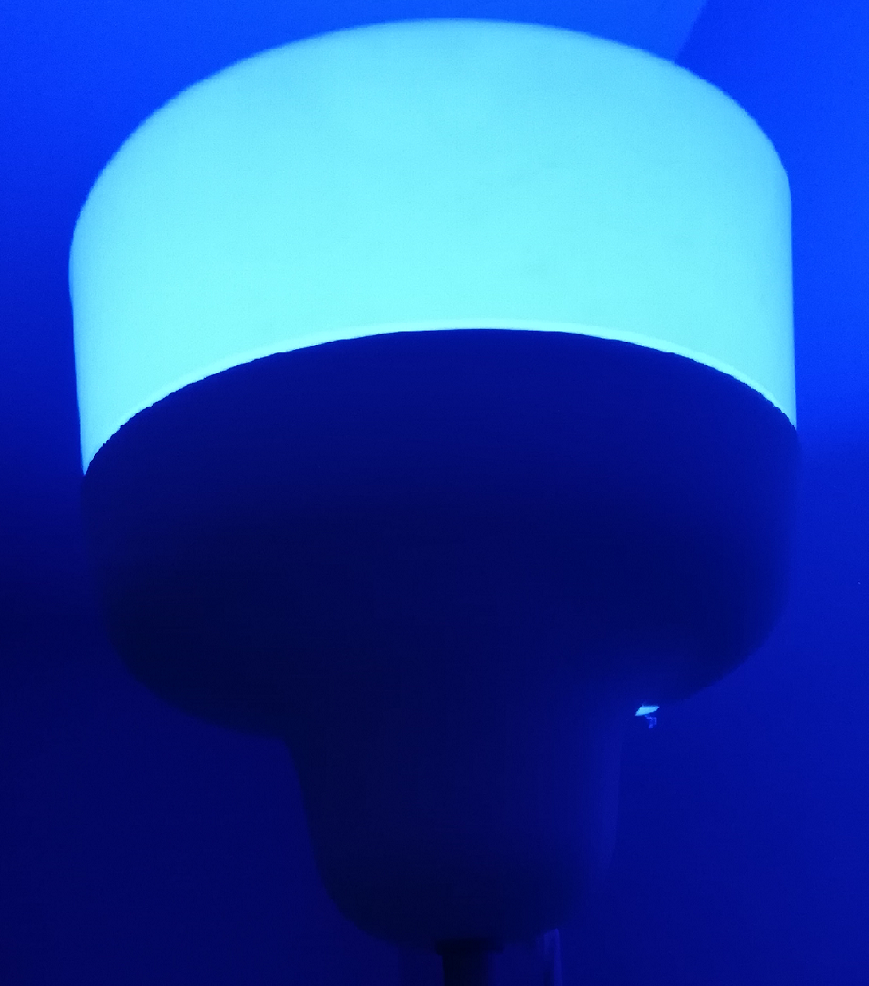Katie Roche's Blog
It's World Autism Awareness Day. Here's Why I'm Lighting it up Blue Tonight.

Today is world Autism Awareness Day. Thousands of buildings across the world will be lit up blue. But many people with Autism will be lighting up red instead for Autism Acceptance. I have autism. So where do I stand? Let me explain: there are two major branches of the Autism community. There is the pro-cure community and the neurodiversity community.
The Pro-Cure Community
The idea of Light It Up Blue originates from the pro-cure community. Until a few years ago, this was the dominant branch of the Autism community, who influenced how the public thought about the disorder. This group mostly comprises of mothers of children with severe Autism. They see Autism as a tragedy.
Neurodiversity Community
The neurodiversity community has increasingly started to influence research, policy and public opinion on Autism. They run a parallel event called Red Instead, where people wear red. So, who are the neurodiversity community? It is largely comprised of people who were diagnosed in adulthood or have self-diagnosed with Autism. It also includes other disorders, such as ADHD, Dyslexia and Dyspraxia. The defining characteristic of this group is that they see Autism as a difference, rather than a disorder. Some have even gone as far as to describe curing Autism as “genocide”.
Where I Stand
I am in the Autism community no-man’s land. As an adult with mild Autism, which wasn’t diagnosed until adulthood, my natural home in the Autism community is in the neurodiversity community. However, I disagree with much of what the neurodiversity community stands for. Here’s some of the issues I have:
Is Autism a Gift?
Part of the rationale for not curing Autism is the claim that people with Autism are responsible for many important scientific discoveries and inventions. Therefore, they believe that Autism is beneficial for humanity. Those making this case often rely on retrospective diagnosis of historical figures such as Isaac Newton and Albert Einstein. But these people were never diagnosed during their lifetimes. Furthermore, most scientists and other visionaries don’t have Autism. So, perhaps Autism isn’t such an asset to society. Moreover, most people with Autism aren’t geniuses. Many people with Autism struggle academically. It’s misleading and unhelpful to imply everyone with Autism has above-average intelligence.
Is Self-Diagnosis Valid?
For me, the biggest problem with the neurodiversity community is that I don’t think many of them actually have Autism. Or at least, I don’t relate well to their struggles. A big part of the reason for that is that many of them are self-diagnosed. I do not agree that self-diagnosis is valid. I don’t doubt for a second that some self-diagnosed people genuinely do have Autism. But I think they are in a minority. I accept that people in the USA or other countries who don’t have a public healthcare system can't afford a diagnostic assessment. However, it’s increasingly common to find people who either could access a diagnostic assessment. Or even worse, people who’ve been assessed and told they do not have Autism, yet still describe themselves as Autistic.
The neurodiversity community claims that everyone who “feels” they have Autism has Autism. I completely disagree with this for several reasons. First, people aren’t the best at judging their own abilities. An infamous example is Dunning-Kruger effect. The Dunning-Kruger effect shows that many people over-estimate their own abilities in activities they perform poorly in, and under-estimate their capabilities in tasks they perform well in. Secondly, the neurodiversity community seem to have developed their own version of Autism. This Autism seems to mean “feeling a bit different”, enjoying relaxing activities such as hot baths and watching Netflix, and not liking loud noises. This isn’t a disorder. It’s normal.
The third issue is to do with masked or repressed Autism. What is masked Autism? The idea is that a person with Autism can learn to conceal their symptoms. Some do this so well, their condition goes unnoticed throughout their lives. In a few cases, the ability to mask is so strong that medical professionals cannot identify that the person has Autism. It is said to be more common in women, and that this phenomenon explains why Autism is more frequently diagnosed in men compared to women. This is talked about often in the neurodiversity community. Some even describe “relearning” their Autism symptoms after deciding they have Autism. This is not what having Autism is like. If you are putting on symptoms of Autism, then you don’t have Autism.
You can read more about masking from these articles by Eric Fombonne. Here’s a basic overview, and another article that’s more in-depth. Fombonne describes the many flaws with the concept of masking. It’s poorly defined. Most research is poor quality. And many traits of masking are actually symptoms of social anxiety, such as feeling conscious of how they are perceived or that they are being negatively judged.
I agree with Fombonne’s point that many people with “masked” autism actually have social anxiety disorder. I can see why a person with social anxiety might think they have Autism. People with Social anxiety are often very afraid of hurting other people’s feelings. And many self-diagnosed people say “I’m frightened I’m hurting people’s feelings without realizing”. They can think they’ve upset someone when they haven’t. This isn’t because they have poor social skills. Part of social anxiety is perceiving their social skills are very bad.
This is why external evaluation is needed. A person with Autism unintentionally upsets people. So, the doctor performing the evaluation can determine a person’s social skills and whether any fears of upsetting people are reasonable. Social anxiety and Autism might outwardly share some symptoms. For instance, being anxious about new places. But their anxiety stems from different sources.
So why would a person want to say they have Autism? The problem is that Autism is perceived as a “nice” disorder. It doesn’t carry the same stigma as other developmental or psychiatric disorders. Which is why a diagnosis is so sought-after. The real solution is to try and destigmatize other disorders. There’s several reasons for this.
- Autism has been trivialized by well-meaning doctors. For instance, look at the term “special interests”. People with Autism are often described as having special interests. These are typically very narrow, deep interests that take up most of a person’s time. They are often repetitive. For example, watching a film repeatedly. But most people have special interests. So, if you were reading a list of Autism symptoms, and you saw special interests, it’s something most people would relate to. I’ve come across people in the ND community list six or seven special interests. Or who don’t spend a lot of time on their special interests. Special interests sounds much more benign and relatable than obsessive interests. Autism is now more seen as a personality type rather than a disorder.
- An Autism doesn’t carry the same blame as other disorders. Many developmental or mental health disorders are blamed on either the way the child was raised or for the mother’s behaviour during the pregnancy. For instance, Foetal alcohol syndrome. Personality disorders are often attributed to a child’s upbringing. Or they are perceived as a personal failing.
- Other disorders have a bad name. For instance, there's an argument that Borderline personality disorder (BPD) is often mistakenly diagnosed in people with Autism. Having met people with BPD, I was surprised by this. In my experience, people with BPD are often gregarious, care greatly what people think about them. In terms of their lives and interests, they tend to go wherever their mood takes them. From taking a snap holiday to leaving a job after an argument. This is the opposite of most people with Autism. Most of us have a strict routine, prefer our own company and struggle to understand how others perceive us. It's difficult to imagine how the two disorders could be confused. But unlike Autism, borderline personality disorder is greatly stigmatized. It is associated with manipulative behaviours, dishonesty and being "difficult". It’s understandable that people would be embarrassed to admit they have this disorder. On the other hand, people with Autism are seen as well-meaning, loyal, honest and hardworking. Which is why a person with BPD might self-diagnose with Autism. This is just one example of a person seeking to replace their stigmatized label with a less stigmatized one. And this is a huge problem. No disorder should be seen as “better” or “worse” than another. The answer isn't to try and "save" people from a stigmatized label by broadening Autism. Nobody should be made to feel ashamed of their mental illness or developmental disorder.
Another problem I have with neurodiversity is that it turns Autism into a personal failing. Their views play into the idea of “the only true disability is a bad attitude”. This approach is loved by non-disabled people. It assuages their fears of having a child with Autism. The idea of having a family member with Autism scares many people. A person who can’t speak, will never live independently is heart-wrenching. But neurodiversity provides hope. Yes, anyone could have a child with Autism. But as long as the child puts the effort in, they can live a normal life. Nobody thinks their child or another child in their life has a bad attitude. So they think “if I had a child with Autism, it wouldn’t be like the child on television or newspaper who can’t speak, melts down in public and hasn’t mastered many other basic milestones.
It plays into the idea that disabled people are responsible for their own plight. We all know that disabled people deserve sympathy and financial support. But the idea that a disabled person could try harder to overcome their circumstances is used as a justification for withholding that support. This has been going on in the UK for many years, with huge cuts to disability benefits and social care. This is what’s currently happening with Autism. If there’s no such thing as severe Autism, why can’t everyone with Autism have a job and lead a completely normal independent life? Why pay disability benefits, for social care or extra educational support when Autism can be overcome through effort?
Can Autism be categorized into Severity levels?
Another point of contention within the Autism communities is on severity levels. The neurodiversity community rejects the notion of mild, moderate and severe Autism. Their view is that the only difference in Autism severity is how well a person can mask their Autism. I understand the problem. High functioning can wrongly imply that a person has better than average functioning. When they actually have closer to normal functioning than someone deemed low functioning. Neurodiversity advocates seem envious of those labelled as severely Autistic.
But by denying severity levels, you overlook those with the most challenges. An example of the consequences of ignoring severity levels is the case Osime Brown. Brown has learning disability and Autism. He lives in the UK and has done since he was a young boy. He was sent to prison for committing a robbery with a group of friends. Although witnesses report he tried to stop the robbery. He is now due to be deported to Jamaica. He believes he can take the bus from Jamaica to his home town of Dudley. The idea of deporting such a vulnerable man is outrageous. But this shows the dangers of arguing Autism doesn't have severity levels. His case is clearly not the same as a person with mild Autism. Which is why moderate/severe Autism label is important. If Osime had mild Autism, the deportation would still be very distressing. But he’d potentially be able to manage to live by himself. However, Osime relies heavily on his family for help with very basic tasks. He certainly can’t make TikTok videos or blog posts about what his life is like. Which is why severity levels matter.
Is Autism too broad or too narrow a label?
The pro-cure community argue too many people diagnosed with Autism. And that that is taking support away from their own children. I disagree. A lot of people with mild Autism might appear to be normal. But usually, this is the result of a strong support network. Furthermore, in the past, people with mild Autism were diagnosed with different conditions. For example, the singer Susan Boyle was diagnosed with Autism as an adult. Originally, she’d been diagnosed as having a learning disability. Other people were misdiagnosed with psychiatric disorders, such as Schizophrenia. In addition, undiagnosed Autism is thought to be common in rough sleepers. In one study, 12% of a sample of rough sleepers screened positive for Autism. Nonetheless, there are cases where people are misdiagnosed with Autism. I also think the self-diagnosed give the impression that Autism is more common than it really is.
In contrast, the neurodiversity community argues that Autism is massively underdiagnosed. They claim that the diagnostic criteria is inaccurate. They argue it is based on the Autism presentation in white, heterosexual, “cisgender” males. As a consequence, it often misses Autism in ethnic minorities, women and LGBT people. And that doctors don’t have the ability to spot Autism in certain groups. Which is why many members of the community are undiagnosed. Some go as far as to describe having a formal diagnosis as a privilege.
But this is wrong. First, Autism is diagnosed at higher rates in ethnic minorities than in white people. At least in the UK. Black children enrolled in British schools are 38% more likely to be diagnosed with Autism than white children. So, the claim that Autism is underdiagnosed in ethnic minorities is wrong. As well, the criteria is mostly based on Autism presentation in children. I don’t know how you’d know a non-verbal toddler’s sexual orientation. Or how a gay child’s Autism would differ from a straight child’s Autism. Furthermore, a study conducted in 2018 found that people diagnosed with Autism are less likely to be heterosexual than the general population. They are also much more likely to be transgender. So, the Autism criteria isn’t skewed against these groups. Which means Autism probably isn’t being underdiagnosed in ethnic minorities and LGBT people.
So why am I lighting it up blue rather than red? Because the neurodiversity movement is having too much influence on Autism research and the general population’s understanding of Autism. They are making it harder for people like me to get through life. And they make it even more difficult for those with severe Autism. Which is why my light will be blue tonight. I know it won’t make much difference. But perhaps a passer-by will notice a lot of buildings are blue tonight and decide to find out why. Hopefully, they’ll learn a bit about Autism. Maybe someone will even donate to Autism research. That’s the best I can hope for.
See previous post
See next post
See older posts
If you enjoyed this article, please consider making a donation to support the site.






